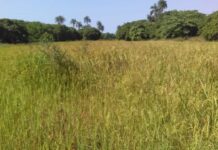By Muhammad Bah Mr. Ansumana Jarju, Director General of the National Agricultural Research Institute (NARI), in presenting his institution’s 2013 Report to the Public Accounts and Public Enterprises Committee (PAC/PEC) ofthe National Assembly, on Monday, 20 May, 2015 said the subvention and budget for the year 2013 decreased by D2, 211,129.00 compared to the preceding year (2012). This, he added, resulted in a reduction in development and research funding. He said NARI in 2012 received D9, 935,725.00 for subvention and D4, 100,304.00 Development and Research funds compared to disbursements in 2013 which were D10, 424,900.00 and D1, 400,000.00, respectively. Mr. Jarju told the PAC/PEC that in order to compliment the development and research allocations in 2013, NARI had to resort to mobilising a substantial funding amounting to D20, 420,192.00 from external sources such as International Research Centers (IACRS), donor institutions and other organisations through competitive research grants collaborative project ventures. The NARI DG said the subvention and development funding from government continues to be the main source of funding for the Institute. In 2013, he said the allocation of funds from the GLF to NARI was healthy and were able to sustain its fixed cost, albeit, regular increase in personnel and other recurrent costs which constitute a large proportion of the funds being spent. He further told the PAC/PEC members that NARI was able to come up with prudent financial measures and continued with a steady financial policy aimed at engaging the Ministries of Agriculture and Finance and Economic Affairs for proper and adequate funding of its Development /Research portfolio to enable NARI develop, renovate and improve research infrastructure and subsequently fulfill its national mandate Concluding, he said the submission of research grant and proposal started to payoff in the second quarter of 2013 and that the Institute enjoyed improvements in their subvention, adding that there is a significant shortfall in development funds disbursement which enabled them to settle part of their social security and income tax liabilities and continue to pay on a monthly basis. Sheikh Omar Taal, Chairman of NARI Board of Directors, told the PAC/PEC the many ways that Gambia could achieved food self-sufficiency, citing rice as an example. He said if Gambia could utilize its two important natural resources i.e. land and water, there is no doubt that the country could reach food self-sufficiency. However, NARI was found to be 38% compliant under the Gambia Public Procurement Authority (GPPA) and which denotes non-compliance.]]>
© 2019 Foroyaa Newspaper - Site by DigiTech Solutions




















